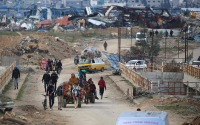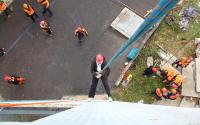1 September 2006Ben Russell
Pressure for an international ban on cluster bombs has intensified as Israel stands accused of littering southern Lebanon with thousands of unexploded bombs in the final hours of its war against Hizbollah.
Campaigners yesterday accused the Israel Defence Force of leaving a "minefield" of deadly bomblets in villages and fields after firing hundreds of cluster shells, rockets and bombs across its northern border in the three days before hostilities ended earlier this month.
United Nations officials said that 12 people had been killed, and another 49 injured by such bombs since the war ended and that the casualty rate was likely to rise.
The Israeli government insists that it did not target civilians during the conflict and says all weaponry used was in accordance with international law.
Israel insists its use of weaponry is legal. However, anti-landmine campaigners have been pressing for an international ban on their use, arguing that cluster bombs are indiscriminate and their use in populated areas may contravene international law.
Mine-clearance specialists said densely populated southern Lebanon was blighted by thousands of unexploded bomblets, which can kill or maim if they are moved or touched. In one case this week 35 bomblets were cleared from in and around one house, while in another a woman lost her hands when a bomblet apparently became tangled in her tobacco crop.
Yesterday the United Nations official in charge of bomb disposal in southern Lebanon said his staff had identified 390 strikes by cluster munitions, and had disposed of more than 2,000 bomblets since the ceasefire.
Chris Clarke, head of the UN mine action service in southern Lebanon, said: "This is without a doubt the worst post-conflict cluster bomb contamination I have ever seen."
In a presentation at the international conference on conventional weapons in Geneva yesterday, he said that the "vast majority" of cluster bombs had been fired by the Israeli Defence Force in the final three days of the conflict, prompting campaigners to accuse the Israeli government of targeting civilian populations.
Mr Clarke, who has worked in bomb clearance in Sudan, Kosovo, Kuwait and Bosnia, said the number of confirmed strikes was "climbing every day". He said: "They are everywhere in south Lebanon. We are still looking. Pretty much the whole of south Lebanon is carpeted with these things." He predicted that specialists would take up to six months to remove the worst threat from unexploded weaponry and said full clearance could take a further year.
Speaking from Lebanon yesterday Sean Sutton, of the Mines Action Group, which has 80 staff clearing the unexploded bombs, said: "This is pretty widespread across the whole of southern Lebanon. There are literally thousands of unexploded munitions in and around the remains of people's homes and on the roads and streets."
Simon Conway, director of the British charity Landmine Action, condemned Israel's "cynical" use of the weapons. He said: "The premeditated targeting of residential areas with high failure-rate cluster munitions in the final days of the conflict means that the rubble-filled villages of southern Lebanon have been deliberately turned into minefields that will indiscriminately kill civilians for years to come."
Yesterday the charity published a report highlighting the use of cluster bombs in Lebanon and calling for an immediate international ban on their use.
Frank Cook, Labour chairman of the Commons all-party Landmine Group, added: "These weapons are totally indiscriminate. For them to be used by Israel among a civilian population is quite outrageously inexcusable."
Susan Kramer, the Liberal Democrat international development spokesman, said: "Cluster munitions need to be outlawed once and for all. Lebanon is still suffering from their use by the Israelis in 1978 and 1982."
A spokesman for the Israeli embassy in London insisted the country's armed forces did not target civilians. He said: "Israel does not use any weaponry that is forbidden under international law or conventions."
Unexploded hazards
Cluster bombs are designed to deliver a devastating blitz on military vehicles and troop emplacements, each device scattering hundreds of explosive "bomblets" over a wide area.
However, their use has become highly controversial, with campaigners likening them to landmines, warning that strikes can leave hundreds of deadly unexploded weapons strewn across a battlefield decades after the troops have left.
The individual devices, about the size of a tin can, can inflict severe or even fatal injuries if they are moved or handled by unsuspecting civilians returning to an affected area.
UN mine clearance experts have identified 390 strikes by Israeli cluster bombs in its recent war in Lebanon. Munitions include American-made M42 and M47 shells which each contain about 80 bomblets. UN staff have also found the remains of Israeli-manufactured M85 weapons, which are fired by rocket and contain 644 bomblets. They say that American-made cluster bombs dropped from aircraft have also been used.
Bomblets are designed to explode on impact. However, campaigners say that a high proportion fail to detonate and remain as a hazard for civilians. Experts in Lebanon say that up to half of the bomblets dropped during the recent conflict remain unexploded.
http://news.independent.co.uk/world/politics/article1222829.ece






